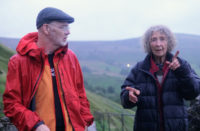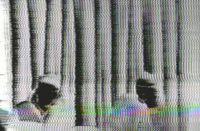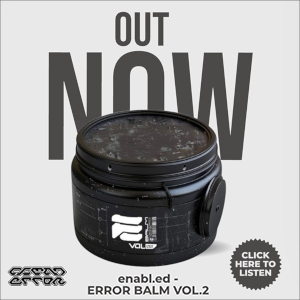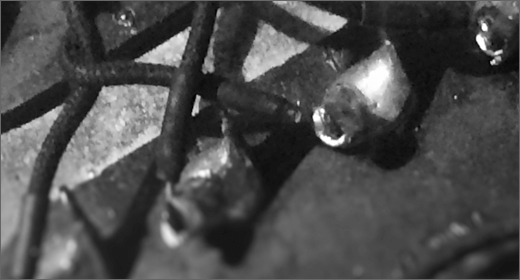 A BOLTFISH Recordings label profile; an organic electronic music imprint…
A BOLTFISH Recordings label profile; an organic electronic music imprint…
::..:::…..:..::….:::::..:::..:::::::……:::…::.:::….::::..:..:::…::…….:::::
Victoria Morehead :: How did you first get into electronic music?
Murray/Mint :: I first got into electronic music as a genre probably back in the late 1980s and early 1990s although Wil and I have actually been collaborating on our own creations using keyboards and synths since around that time too, without any real external influence that we were aware of. The key reason for listening to the music was, I think, just an age thing (I’d already been through my heavy metal and Indie phases) but the reason for making it was because it was possible to create something without a ‘band’. Having been in a few bands at school it always annoyed me that there was always such a discussion about what to play while all I had were ideas running round my head of what I wanted to create.
Wil/Cheju :: My first interest in electronic music was hearing Kraftwerk in the late 70’s, but like Murray I also spent most of the 80’s listening to more guitar-based music – postrock, indie, punk, industrial etc. I then got into electronic music through listening to Industrial and EBM, firstly bands like Coil, Front 242, early Nine Inch Nails, and then later artists like Aphex Twin, Squarepusher, Mu-ziq. I was definitely more interested in the darker, noisier side of electronic music, but age has mellowed and broadened my tastes somewhat. My reasons for starting to make electronic music were very similar to Murray’s – having played guitar in a couple of bands at school, I discovered I was more interested in composition and the recording process than in playing as part of a group. So I borrowed a 4 track and drum machine from a friend and began experimenting with building up layers of beats, guitars and cheesy home keyboards.
VM :: Who were your influences, and how would you define the evolution of your own music up until now?
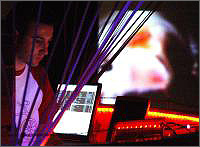
Murray :: Once I’d begun buying electronic music seriously, influences included Sven Vath, The Orb, Black Dog, Spicelab. However I’ve always been heavily influenced by classical music too, so Beethoven and Pachelbel stand out in my mind.
My music has evolved from attempting to make tunes with anything I could get my hands on (which ranged from half an electronic drum kit and an old Casio Keyboard to a beanbag seat for crunchy sound effects!) on an old cassette recorder to having a ‘professional’ setup with a wealth of sounds to draw from. The ideas are still similar, just the execution so more complex and the end result is a little more satisfying.
Wil :: My influences when I began creating electronic music were the previously mentioned Industrial and experimental bands along with all-time favorites The Cure, the Velvet Underground, My Bloody Valentine, and some more contemporary electronic artists, in particular the Artificial Intelligence releases on Warp. In the decade or so since then, I have become increasingly interested in the emerging electronica and IDM scenes. A change in listening habits and a gradual accumulation of hardware and software has led to my own music evolving into a more melodic and softer entity. My interest in noise remains, but has evolved from a simple love of distortion and feedback to slightly subtler elements – glitches, static, clicks and cuts etc.
VM :: Electronica is such an intimate form of music; often the artist is doing everything solo. Is there a kind of zone you go into when creating music?
Murray :: Hmm, can be like that. I must admit I like to concentrate sometimes, but I like to think of myself as a pretty sociable person, and I love the process of collaboration with someone where you can discuss what you’re doing, what sounds to choose, what mood you’re after, and then try and achieve it. Sometimes if you’re really in the mood then it can be good to work on things in a block of time though. On the flipside I’m eager to do more live performance since it’s great playing out and seeing how people react – taking the solo performance out of it’s hole and making something of it. I’m not one for hiding behind a laptop all night and not conversing with people!
Wil :: I also enjoy the process of collaboration – especially when working on slightly more dancefloor-friendly tracks, I find it easier to get the groove and vibe into a track whilst working with someone else, where you can feed off each other’s energy. For my solo creations however, I do tend to lock myself away for hours, sometime days on end, laboring over sounds and textures.
VM :: Besides being musicians, both of you are involved in other pursuits as well. How do you juggle so much work and still manage to make your own music?
Murray :: Ha. It’s certainly a juggling act. For the past year my other business pursuits (where I make my living) have been somewhat busy, so writing new music has taken a bit of a back seat which is a little annoying. Still, it’s a case of finding that balance by using evenings to work on new material. Aside from that there’s running the label too, but both Wil and I are committed and work well together since we know our roles in the label and neither of us gets precious about things.
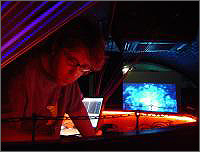
Wil :: My day job is fortunately a little less emotionally taxing. I work in administration for a financial institution – I like to think of myself as a modern day Kafka! The way I tend to organize my time is to work on the label in the evenings during the week and then work on my own music when I have weekends spare. I also work occasionally as a freelance art critic, but this has had to take a backseat since setting up the label.
VM :: What inspires you when it comes to making music? Do you find yourself revisiting old skool sounds for ideas, or does it happen more organically?
Murray :: As many artists may say.. anything! Sometimes it’ll be music – and it may be something old skool. Sometimes it may be day-to-day stuff. I’ve been inspired a lot by my 3yr old niece and 1yr old nephew.
Wil :: Yes, I think it does happen more organically – rather than taking inspiration from particular artists or sounds, I think it is more a natural filtering through of all experiences, musical or otherwise. I enjoy the abstract nature of instrumental electronic music. Certain tracks may be inspired by particular emotions or events, but what is important for me is how it affects the listener as an individual – I like the fact that this style of music can conjure up so many different images and feelings in different people.
VM :: The fact that you’re a non-profit label shows just how much you both support the independent electronic artist community. What made you decide to start a label, especially with no intentions of making money from it? What are some of the challenges involved with setting up an indie label? And what are the challenges involved with running one?
Murray :: I think like so many businesses, we started up because we had a passion for what we were doing. Also it seemed like we weren’t seeing quite what we wanted out there so we felt we may as well do it ourselves. One of our initial discussions about starting a label was borne out of being annoyed by sending demos to labels and never receiving any decent feedback, or none at all. We made a policy there and then that we’d always try to reply to every demo and give some kind of feedback.
Challenges were mainly the learning process of what was involved and how we’d fund things. Beyond that there’s a regular challenge of getting stuff out there – receiving reviews of releases, planning new releases, creating the artwork (all of which we do in-house), running the website, etc.
VM :: What do you look for when signing talent to your label? What advice would you give musicians interested in getting their music heard by an electronic label?
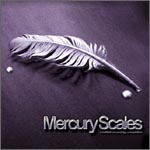
Murray :: We look for something that fits our style – it’s hard to write a recipe of what that is. I think it shows in the music we’ve released though. When we receive demos we, like almost every other label, like things to be sensibly presented. Obviously the music speaks for itself, but a scrappy CD with no introductory note is seldom appreciated. Also; we’re often annoyed by people sending us demos when they clearly aren’t creating anything like our genre of music. They just waste their own time and ours. As such, advice is: Send to the correct type of label, present your demo in a tidy way (it doesn’t have to look professional, but it should be presentable), don’t send a demo with 20 tracks, 4 is plenty.
Wil :: It’s definitely important to do some research. You shouldn’t expect a label to take the time to listen to and reply to your demo, if you’ve not taken the time to familiarize yourself with their style and artist roster. And yes, 4 tracks is plenty – if a label likes what they hear, they will ask you to send more. And always put your best tracks first.
VM :: Electronic music has really started moving into the mainstream in recent years–be it on larger labels, through soundtracks or in attempts to make car commercials hip. How do you feel about that? Is the dilution of the genre something that indie labels dread, or do you anticipate it being a catalyst for pushing electronica in a new direction?
Murray :: It’s great that electronic music might reach more people. I’m not one to fiercely want our genre to remain underground. The only danger of anything becoming larger is when those without a passion for its roots simply want to turn a fast buck from it since they then cheapen the whole genre. Pop music was once about ‘popular music’ – now it’s a machine that churns out mostly tripe. However, for every electronic music mogul who wants take things and homogenize them into a moneymaking formula I’d like to think there will always be 100 who want to keep it fresh and alive.
Wil :: The movement into the mainstream and the massive growth and accessibility of software has certainly led to the creation of some very fake and lazy electronic music by those wanting to jump on the bandwagon and exploit it. However, I think the same could be said for any form of music, and half a century since the invention of the electric guitar there are still artists of integrity making fresh and exciting guitar-based music.
VM :: What’s the next direction for electronic music? Where do you see it going?
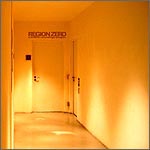
Murray :: Obviously the blending of electronic music with other things has been occurring for ages, so the whole post-rock thing and folktronica (or whatever you want to call it) is one direction. However, I think there’s also such breadth in what ‘electronic music’ is and can be that there’s no real bounds to it. Personally I’d like to see a real development of what I’d term as “kiddytronics”, where we get on touch with our youth and explore the playful side of things a little more. But that’s just cos I’m a big kid at heart and don’t take anything seriously!
Wil :: I don’t think it’s really possibly to predict the future direction of electronic music, but I think it will continue to both fragment and coalesce, splintering off into sub-genres and forming new hybrid styles. I certainly believe that electronic music has a long and exciting life ahead of it – it is a medium that has the potential to create any sound, real or imagined, so its boundaries are limitless.
::..:::…..:..::….:::::..:::..:::::::……:::…::.:::….::::..:..:::…::…….:::::
For more info about Boltfish, visit their website here.







